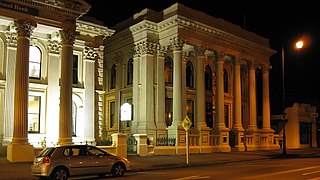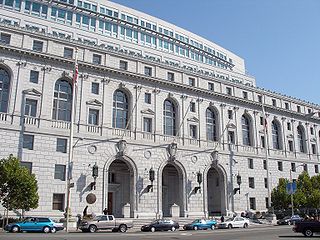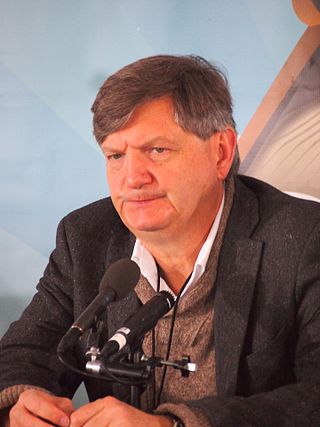
A non-disclosure agreement (NDA), also known as a confidentiality agreement (CA), confidential disclosure agreement (CDA), proprietary information agreement (PIA), or secrecy agreement (SA), is a legal contract or part of a contract between at least two parties that outlines confidential material, knowledge, or information that the parties wish to share with one another for certain purposes, but wish to restrict access to. Doctor–patient confidentiality, attorney–client privilege, priest–penitent privilege and bank–client confidentiality agreements are examples of NDAs, which are often not enshrined in a written contract between the parties.
Executive privilege is the right of the president of the United States and other members of the executive branch to maintain confidential communications under certain circumstances within the executive branch and to resist some subpoenas and other oversight by the legislative and judicial branches of government in pursuit of particular information or personnel relating to those confidential communications. The right comes into effect when revealing the information would impair governmental functions. Neither executive privilege nor the oversight power of Congress is explicitly mentioned in the United States Constitution. However, the Supreme Court of the United States has ruled that executive privilege and congressional oversight each are a consequence of the doctrine of the separation of powers, derived from the supremacy of each branch in its area of constitutional activity.
Attorney–client privilege or lawyer–client privilege is the common law doctrine of legal professional privilege in the United States. Attorney–client privilege is "[a] client's right to refuse to disclose and to prevent any other person from disclosing confidential communications between the client and the attorney."
Confidentiality involves a set of rules or a promise usually executed through confidentiality agreements that limits the access to or places restrictions on distribution of certain types of information.
A subpoena duces tecum, or subpoena for production of evidence, is a court summons ordering the recipient to appear before the court and produce documents or other tangible evidence for use at a hearing or trial. In some jurisdictions, it can also be issued by legislative bodies such as county boards of supervisors.
Branzburg v. Hayes, 408 U.S. 665 (1972), was a landmark decision of the US Supreme Court invalidating the use of the First Amendment as a defense for reporters summoned to testify before a grand jury. The case was argued February 23, 1972, and decided June 29 of the same year. The reporters lost their case by a vote of 5–4. This case is cited for the rule that in federal courts, a reporter may not generally avoid testifying in a criminal grand jury, and is one of a limited number of cases in which the U.S. Supreme Court has considered the use of reporters' privilege.
In journalism, a source is a person, publication, or knowledge of other record or document that gives timely information. Outside journalism, sources are sometimes known as "news sources". Examples of sources include but are not limited to official records, publications or broadcasts, officials in government or business, organizations or corporations, witnesses of crime, accidents or other events, and people involved with or affected by a news event or issue.

Apple v. Does was a high-profile legal proceeding in United States of America notable for bringing into question the breadth of the shield law protecting journalists from being forced to reveal their sources, and whether that law applied to online news journalists writing about corporate trade secrets. The case was also notable for the large collection of amici curiae who joined in the matter.

James Risen is an American journalist for The Intercept. He previously worked for The New York Times and before that for Los Angeles Times. He has written or co-written many articles concerning U.S. government activities and is the author or co-author of two books about the Central Intelligence Agency (CIA) and a book about the American public debate about abortion. Risen is a Pulitzer Prize winner.

James C. Goodale was the vice president and general counsel for The New York Times and, later, the Times' vice chairman.
The Reporters Committee for Freedom of the Press(RCFP) is a nonprofit organization based in Washington, D.C., that provides pro bono legal services and resources to and on behalf of journalists. The organization pursues litigation, offers direct representation, submits amicus curiae briefs, and provides other legal assistance on matters involving the First Amendment, press freedom, freedom of information, and court access issues.
Reporter's privilege in the United States, is a "reporter's protection under constitutional or statutory law, from being compelled to testify about confidential information or sources." It may be described in the US as the qualified (limited) First Amendment or statutory right many jurisdictions have given to journalists in protecting their confidential sources from discovery.
In common law jurisdictions and some civil law jurisdictions, legal professional privilege protects all communications between a professional legal adviser and his or her clients from being disclosed without the permission of the client. The privilege is that of the client and not that of the lawyer.
Source protection, sometimes also referred to as source confidentiality or in the U.S. as the reporter's privilege, is a right accorded to journalists under the laws of many countries, as well as under international law. It prohibits authorities, including the courts, from compelling a journalist to reveal the identity of an anonymous source for a story. The right is based on a recognition that without a strong guarantee of anonymity, many would be deterred from coming forward and sharing information of public interests with journalists.
In Australia, legal professional privilege is a rule of law protecting communications between legal practitioners and their clients from disclosure under compulsion of court or statute. While the rule of legal professional privilege in Australia largely mirrors that of other Commonwealth jurisdictions, there are a number of notable qualifications and modifications to the privilege specific to Australia and its states, and contentious issues about the direction of the privilege.
The Free Flow of Information Act is a bill intended to provide a news reporter with the right to refuse to testify as to information or sources of information obtained during the newsgathering and dissemination process.
Myron A. Farber is an American newspaper reporter for The New York Times, whose investigations into the deaths of several patients at an Oradell, New Jersey, hospital led to the murder trial of Mario Jascalevich, a physician at the hospital who was alleged to have used a powerful muscle relaxant in what became known as the "Dr. X" case. After refusing to turn over notes from his investigation in response to a subpoena from the defense attorney in the case, Farber was jailed for contempt and the newspaper fined, ending up spending 40 days in jail with fines of $285,000 assessed. Appealed to the Supreme Court of the United States, the case set a precedent for the limitations of shield laws in the United States.

The California Shield Law provides statutory and constitutional protections to journalists seeking to maintain the confidentiality of an unnamed source or unpublished information obtained during newsgathering. The shield law is currently codified in Article I, section 2(b) of the California Constitution and section 1070 of the Evidence Code. Section 1986.1 of the California Code of Civil Procedure (CCP) supplements these principal shield law provisions by providing additional safeguards to a reporter whose records are being subpoenaed.

The Mortgage Specialists, Inc. v. Implode-Explode Heavy Industries, Inc. is a New Hampshire Supreme Court case in which Mortgage Specialists, a mortgage lender, sought to obtain the identity of an anonymous source who provided Implode-Explode Heavy Industries (Implode), a website monitoring risky lenders, with a confidential document detailing Mortgage Specialists' loan practices. Mortgage Specialists also sought to prohibit the republication of the document and learn the identity of an anonymous individual who allegedly defamed Mortgage Specialists on Implode's website. Mortgage Specialists disputed Implode's status as a news organization, claiming that it should not be afforded the rights of a news organization under the First Amendment to the U.S. Constitution and Part I, Article 22 of the New Hampshire Constitution.
In 2013, the United States Department of Justice, under Attorney General Eric Holder, came under scrutiny from the media and some members of Congress for subpoenaing phone records from the Associated Press (AP). Under similar justifications, a 2010 subpoena approved by Eric Holder implicated Fox News reporter, James Rosen, as a possible co-conspirator under the Espionage Act of 1917. Investigators gained access to the times of his phone calls, and two days of Rosen's emails. Stephen Jin-Woo Kim eventually pleaded guilty to violating the Espionage Act for communicating North Korean nuclear test plans to Rosen. These investigations provoked considerable criticism from major news organizations, and precipitated the revision of media guidelines at the Department of Justice.





